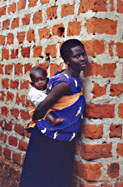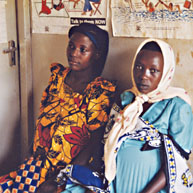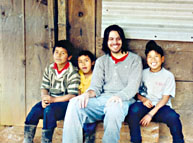Summer school: McGill students learn through volunteering
Summer school: McGill students learn through volunteering McGill University
User Tools (skip):
Summer school
McGill students learn through volunteering
September saw McGill's 28,000 undergraduates and graduates flooding through the Roddick gates and into classes. Among that stream of eager learners were five students who had never left the classroom for the summer. In their cases, the halls of instruction were refugee camps and hospital wards. Antoine Libert, a third-year anthropology student, and Josey Seydoux, a first-year Latin American and Carribean studies student, were in Chiapas, Mexico. Second-year law and social work student Jordan Topp had been at the Burj al Barajneh refugee camp in Lebanon, and Kathy Ramsey, a second-year law student, was returning from the Shatila refugee camp, also in Lebanon. Third-year medical student Hannah Shenker spent the summer in Uganda.

Kiboga, Uganda
Bearing witness to a people's struggle is what motivated Libert and Seydoux to spend two weeks in the caracols (Zapatista cultural and political centers) of Chiapas, Mexico, during July. As part of STAC (Students Taking Action in Chiapas), they joined an international caravan of people who demonstrated their solidarity and support for Mexico's Zapatista population. Seydoux says, "The Zapatistas are involved in a famous situation. I wanted to go down and see what is actually going on."
Members of STAC deem the role of international political observer to be of the utmost importance. "We act as neutral observers recording human rights infractions," says Libert. Prior to travelling to Chiapas, volunteers learn how to document human rights violations, how to live communally and how to engage in non-violent resistance.
In Chiapas they visited schools, women's co-ops and local factories. In support of the Zapatista credo "solidarity not charity," they set up means of increasing the Zapatista presence in Canada. "Zapatista collectives don't accept money from the Mexican government," says Libert, "so we have arranged for various goods to be sold here." Café Rico now sells Zapatista-grown coffee, certain stores sell CDs by Zapatista musicians and members of STAC sell Zapatista crafts at the Sunday tam-tams on Mount Royal," says Seydoux. Making links with international communities is how the Zapatistas, as well as STAC members, believe their cause is best served. "They see themselves as part of a global movement, not merely a local movement," says Libert.
Topp and Ramsey are concerned with refugee and human rights issues. CEPAL (Canadian Palestinian Educational Exchange) arranged for the law students to volunteer for eight weeks in two of the 12 UN-operated Palestinian refugee camps in Lebanon. These camps are home to more than 375,000 refugees whose families fled Palestine in 1948. The students taught English to children at a UNRWA (United Nations Relief and Work Agency) school, as well as at a local women's collective. "I wanted to put a face to these people for whom I have been advocating back home," says Ramsey.
Their travels started off as a covert operation in international aid. "It's best not to tell the immigration officer that you are travelling with the sole purpose of assisting the Palestinian refugees," says Topp. "The Lebanese government would prefer not to facilitate any type of assistance for them." While both students felt they were well equipped to meet the challenges of working in refugee camps, they were "not prepared for the overall sense of unavoidable despair you get from being there," says Ramsey, attributing this to the squalid living conditions they and the refugees endured. "Twenty thousand people live within one square kilometre at the Burj al Barajneh camp. People are piled on top of one another because the camp is not allowed to expand. Rats and cockroaches are everywhere. Buildings have collapsed. Water is really scarce and has to be trucked in. And four to five family members sleep in one room."

Kiboga, Uganda
"What I didn't realize," says Ramsey "[was that] these families have been in camps now for 55 years — three generations of refugees. The youth see no point in being educated," because there are no work opportunities. "A lot of young men are risking their lives by attempting to escape to Eastern Europe through illegal channels. Often they are never heard from again." The hopelessness of the situation deeply troubles Topp. "They are not given any status in Lebanon. They are not allowed to return to the occupied territories in Israel. They are barred from over 72 professions. They can't inherit property. The camps are tiny in radius and are not allowed to expand. The population continues to rise. They are in complete and utter limbo."
As law students, Topp and Ramsey are both disillusioned. "According to a UN resolution, a right of return is legally granted to any refugee forced to leave his home," says Topp. "But these laws are not enforced," laments Ramsey. "The Palestinian situation is not just about the law. It's about politics, and that is so hard to fight." While both are committed to finishing law school, they have not yet figured out how they will most effectively put their degrees to use. "I can't say that I'll get a law degree and then go and save the world," says Ramsey. "In fact, I'll be working within a system that at times is oppressing people. The whole thing is depressing."
This sobering reality is taken into account as they ponder their futures as activists. "Finding out where I fit into the bigger picture will depend on what I can offer," says Topp. " I would like to learn what legal skills are required by international aid organizations, and then try to provide them."
An important part of training for second-year medical students at McGill is the required, month-long hospital rotation, in any country of their choosing. Having previously worked and travelled in Panama and Peru, Shenker said she wanted to increase her understanding of international health issues. Thanks to the help of one of her professors, Frank Cooke (who had already been involved on a project in Uganda with the Fédération Internationale de Gynécologues et Obstétriciens), and the McGill International Health Initiative a rotation was set up for Shenker.

Chiapas, Mexico
From her previous experience in developing countries, Shenker knew that shortages in medical supplies and hospital resources would be the norm. What she was not prepared for was the magnitude of chaos she encountered. As soon as she arrived, she was assigned to the delivery ward of the largest hospital in the capital city, Kampala. She had never actually performed a delivery before. "There were about 100 deliveries a day. It is like nothing that anyone who lives here in Canada can ever imagine," says Shenker. (The Royal Victoria Hospital performs 350 deliveries a month.) "There are five beds plus wall-to-wall mattresses on the floor. A bed is offered to you only if someone actually notices that the baby is coming out. During my first day there, a woman just squatted down and out popped a baby." The regular staff consists of one physician and five to ten midwives.
Shenker had to adapt to a cultural shift in medical thinking, particularly concerning pain management. "There is no analgesia in Uganda," she says. The attitude in the delivery room is that "no one will die without it. Besides, they just don't have enough medication to warrant using it in this department." On specific occasions, exceptions are made. "If a C-section is being performed, they actually put the person out by using general anesthesia." But the North American practice of giving epidurals or local anesthesia for various procedures can't possibly be considered in Uganda. "Everybody would be dying of meningitis if people started sticking needles in spines — they are not sterile."
Many Ugandan women make use of more traditional environments. "Only 17 percent of babies are delivered by health care professionals. Most births are actually performed at home by grandmothers and other community members." Women who do enter the hospital receive very limited treatment. "There is no nursing care. Once the baby is out, it is the mother's responsibility. Mother and child are then expected to leave the hospital, provided both are okay."
Shenker's fondest memory of her time in Uganda involves her first delivery. "I had only been in the ward for a couple of days when it became clear that I was going to have to deliver a baby on my own, a girl." Excitement, tinged with responsibility, was her predominant feeling. "My heart was racing. So many circumstances are against them, and I didn't want to add 'inexperienced Canadian med student' to the list." (A midwife contacted Shenker recently and informed her that both the 17-year-old mother and her baby were doing just fine.)
Shenker reflects on her role as a health care practitioner. "When you're in a country like Uganda, you gain an understanding of what the problems and conflicts are, but what to do about them is far less obvious."
Each student returned to McGill knowing that what they learn in the classroom can become the spark igniting their understanding that education is the means to making a difference, for themselves and for others. "I definitely want to work in developing countries, but haven't figured out what they need from Western doctors," says Shenker. "I'll just keep going and when I figure it out, hopefully I'll be at the stage of my career where I can provide it."
For more information, see the following websites: www.stacmontreal.net, www.cepal.ca, and www.medicine.mcgill.ca/mss/clubs/mihi.html for the McGill International Health Initiative.
